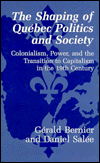

 |

|

The average rating for The shaping of Québec politics and society based on 2 reviews is 3.5 stars.
Review # 1 was written on 2016-10-04 00:00:00 Mauro Andres Mauro AndresCapital City is a somewhat broader history of New York City and the American economy than its subtitle would suggest. It covers more than the years between 1860 and 1900, because the author , CUNY history professor Thomas Kessner, covers the earlier decades of the ninenteenth century. During the decades before the Civil War, merchants in New York extended their businesses from a primary focus on the export/import business to include finance, as they found that loaning out their profits could be just as or more profitable than their original businesses. New York City surpassed rivals Philadelphia and Boston, partly because it had a better harbor than either, partly due to the access to the interior due to the completion of the Erie Canal in 1825, and partly because the merchants of New York City tended to be more agressive, more focused on business, and less risk adverse than those from New York's rivals. The book is also broader in subject matter in that it discusses the local politics and the non-business activities of the local elite. A crucial figure in this aspect of the book is Andrew Haswell Green, a real estate lawyer who was deeply involved in what we would now call urban planning. From his post on the board overseeing the construction of Central Park, he moved on great influence in planning the development of the northern part of Manhattan Island, which had not yet been built up. Green was also an early advocate of amalgamating the separate jurisdictions of New York City, then confined to Manhattan, Brooklyn, the Bronx, Queens and Staten Island into one municipality. Kessner also describes the rise and ebb of active municipal government and the degree of state government control over what would normally be local government functions. The scandals associated with William Tweed after the Civil War, which involved extraordinary corruption in funds used for paving roads, building municipial buildings and so forth (all paid with borrowed money) set back activist goverment for many years after the corruption was exposed. The main reason Andrew Carnegie, John D. Rockefeller, Jay Gould and other capitalists moved to New York City was that it had become the financial center of the United States even before the Civil War. Legislation during the Civil War, and the federal government's reliance on New York banks to finance the war, increased its financial dominance. Gould and Carnegie had come to New York City because at that time they were speculators and thus needed easy access to the stock market. I generally enjoyed the book and thought the author made good points generally. The one aspect I would disagree with the author is his contention that the labor unions in New York City had considerable influence on the behavior of Gould, Carnegie and so on when they had labor troubles. Although Kessner shows that labor unions had local influence with the Democratic Party, after the economic theorist Henry George made a strong showing (with labor support) in a mayoral race, more generally it seems to me that the capitalists more generally stuck with their own initial inclinations, that is to crush labor unrest whenever possible. |
Review # 2 was written on 2014-08-31 00:00:00 Paul Maienza Paul MaienzaThis book appeals to me because of its New York link (and I got it at a used book store), but it is a good look at how the capitalist system under which we live got a real boost. It was that idea that rather than invest in a company, you could invest in part of a company...by buying shares of stock. What a great idea! Our world would not exist without that concept, however things went haywire fairly early. Jay Gould figured out how to cheat the system...people figured out how to avoid tax on their earnings. Anyone interested in American History will enjoy this very readable book to see how our economic rise started not just from exports, but from ways in which we created what is now Wall Street. |
CAN'T FIND WHAT YOU'RE LOOKING FOR? CLICK HERE!!!